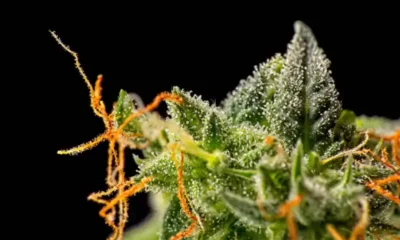Connect with us
Published
3 months agoon
By
Tyler Shultz
Through its recently launched Behavioral Health Innovation Center, Vail Health intends to seek and develop innovative advancements in mental and behavioral health with the help of psilocybin.
Dr. Charles Raison, the director of Vail Health Behavioral Health’s Innovation Center and professor at the University of Wisconsin-Madison, previously served as a lead author on a study on the efficacy of psilocybin for major depressive disorder and aims to use his new position to build upon previous research.
Raison’s previous study found a single dose of psilocybin significantly improved symptoms and functional disability in patients with Major Depressive Disorder. Data from the study showed a 25-mg dose of synthetic psilocybin, along with psychological support, provided a sustained and significant improvement in depressive symptoms compared to a placebo.
Raison believes the increased attention to psilocybin and psychedelic research is mainly due to there being no major advances in the treatment of mental illness in some time, but also hypothesized the reason could be due to “a lot of the people now that are in power positions did psychedelics when they were younger people”
Vail Health launched the Behavioral Health Innovation Center in July 2023, with two of the first three studies conducted by the facility will focus on psilocybin research and the efficacy of its use as a treatment for depression and anxiety. One of the studies, referred to as the OPT-In study, will be conducted at Vail Health Behavioral Health’s Innovation Center and will study the impacts on social behavior and the risks and benefits in a legal situation of the use of psilocybin to treat depression and anxiety, while the other will supplement local research done by the University of Wisconsin-Madison.
The Innovation Center is expected to begin the OPT-In study this summer and aims to build upon previous research by Raison and answer how well psilocybin actually works in the real world as patients come in, an important step as Colorado continues setting up regulations after voters approved to legalize psilocybin in 2022. Raison said they plan to recruit 140 participants and the study will take three to four years to complete.
“By the time the opt-in results are done people will be widely using psilocybin in Colorado, but what the study will do would be to suggest ways that they might be able to use it better and safer,” said Raison. “I think it’ll be even more relevant then because it’s going to be the Wild West in Colorado with psychedelic use for a while, so this is going to provide real guidance on how to do it as best as possible.”
“It’s been a collaborative effort; everybody is working together for the same outcome, which is improved mental health for our community, reduced substance abuse for our community,” said Chris Lindley, Vail Health’s chief population officer. “With this research collaborative, no one knows what the best treatment modality—or the combination of those treatments—will ultimately be. But we’re all open to studying those and trying those with our community and our partners to find the best care for all of our members.”
Researchers continue to explore the medicinal benefits and have found potential uses to treat a variety of mental health disorders. The Department of Veterans Affairs requested proposals from its researchers to study the potential of methylenedioxymethamphetamine (MDMA) and psilocybin in treating post-traumatic stress disorder (PTSD) and depression, making it the first time the organization had dedicated funding to that field of research. Other research has looked at other potential therapeutic uses for the drug, including as a means to overcome treatment-resistant conditions and eating disorders such as body dysmorphia, anorexia, or bulimia. Researchers believe the use of psilocybin can help treat the underlying causes of an eating disorder by improving cognitive flexibility.


Despite City Efforts, Hemp Shops Posing as Dispensaries Prevail in Las Vegas


Cannabis Community, Investors React to DEA Decision To Reschedule


Georgia Governor Signs Bill Establishing Licensing Requirements To Grow Hemp


Study: Psilocybin Enhances Meditation


Ohio GOP Lawmakers Debate Adult-Use MJ Priorities, Eye June for Regulation Approval


Taylor Swift Puts Narcotics Into All of Her Songs on ‘The Tortured Poets Department’
